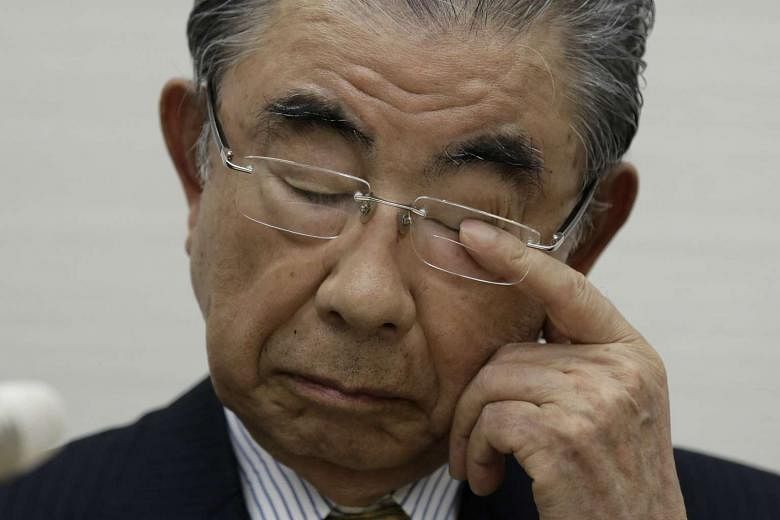TOKYO (BLOOMBERG) - The idea of an octogenarian CEO in questionable health ousting a potential successor to make way for his own son would be met by hackles, maybe even outright laughter, by many corporate governance experts and shareholder activists in the US and Europe.
Yet that's what Dan Loeb accused Seven & i Holdings chief executive officer Toshifumi Suzuki of having in mind for Japan's biggest retailer, which operates the Seven-Eleven, Denny's and Ito-Yokado retail brands. Suzuki, 83, might have succeeded were it not for a shaming campaign by Loeb, the billionaire activist investor and founder of hedge fund Third Point.
On Thursday ( April 7), the Seven & i board rejected a plan to remove Seven-Eleven Japan president Ryuichi Isaka, the executive Loeb praised as "instrumental to the success" of the profitable convenience stores unit in a sharply critical letter to the company's board sent March 27.
In addition, he raised concerns for Suzuki's "chronic health problems" and claimed the CEO planned to name an interim president of the core convenience store unit - to be followed later by the promotion of his son, Yasuhiro Suzuki.
"If these rumors are true," Loeb wrote, "they raise serious questions about Mr. Toshifumi Suzuki's competence and judgment and whether he should be making any decisions about the company."
The board's rejection - reached after directors came one vote short of removing Isaka - was a stunning victory for Loeb and prompted Toshifumi Suzuki's resignation hours later. During a bizarre afternoon press conference, the CEO who'd spent more than 50 years at Seven & i and its affiliates appeared with allies to tell his side of the story.
"Some executives around me asked me why I'm retiring," Suzuki said. "After all, it is my lack of virtue and I'm deeply ashamed of myself."
Suzuki denied he was angling for his son to take over, saying he'd never thought of the idea. Masatoshi Ito, the billionaire founder of Seven & i unit Ito-Yokado Co, turned against him. Suzuki said he had little trust left in the directors who cast opposing ballots.
"We are pleased to see that the Seven & i board's succession planning will be based on merit and the best interests of shareholders," Loeb said in a statement.
Beyond the theatrics lies a bigger, long-term effort by activists investors like Loeb, and Prime Minister Shinzo Abe, to improve corporate governance practices in Japan. Foreign investors are huge players in the Japanese stock market and have been net sellers in recent weeks because of concerns with the economy and the government's commitment to economic reforms.
Non-Japanese investors dating to T Boone Pickens in the early 1990s have tried with little success to challenge Japanese companies to be more transparent about management decisions and more mindful of shareholder returns. While Japan has taken notable steps recently, its companies still have one of the lowest rates of independent directors compared with Group of Seven peers.
"Seven & i's management reshuffle is drawing more investors' attention at home and abroad," said Yasuhide Yajima, chief economist at NLI Research Institute in Tokyo. "They are keen to see how proposals were crafted and discussed at the board room, and even more keen to know how directors of the board eventually rejected the proposal in a bid to see if the company's corporate governance practice is working well."
Loeb has emerged as one of Japan Inc's most frequent activists in recent years, having targeted companies as diverse as Suzuki Motor robot maker Fanuc Corp, Sony and jet-engine maker IHI Corp. He's had mixed success in getting the companies to bend to his will. Third Point offloaded its stake in Sony less than two years ago after failing to convince the company to sell part of its entertainment unit.
Last year, Loeb challenged Fanuc to use some of the US$8.5 billion in cash sitting idle on its balance sheet to buy back more shares. The company lifted its dividend and boosted its payout ratio in what a Goldman Sachs analyst said was "a big positive surprise."
In challenging Seven & i over its management succession plans, which Loeb in his March letter said "appear grounded in nepotism," the investor went after one of the nation's most ubiquitous retailing brands.
Seven-Eleven's roots in Japan can be traced back to an initial store opened in 1974 under license from US franchise operator Southland Corp. The Japanese convenience-store unit outgrew its parent and acquired Southland in 1991. Seven-Eleven also out-expanded its parent, Japanese general merchandise chain Ito-Yokado, and the two formed a holding company in 2005 that became the nation's largest retailer.
Toshifumi Suzuki cut his teeth at Ito-Yokado and was chairman of the company at the time of the merger with Seven- Eleven Japan. That deal was in part born by fear of an outsider trying to seize control. Suzuki alluded to Livedoor Co's hostile bid for the radio unit of Japan's biggest media group earlier in 2005 as motivation behind Ito-Yokado selling stock at a discount to Seven-Eleven Japan.
Like any investor, Loeb seeks profits. Yet in his letter to Seven & i, he said his goals were fully consistent with those of Abe's.
"As investors committed to the future of Japan, we are delighted to see corporate governance evolve in line with the principles outlined in Prime Minister Abe's third arrow reforms," he said in the statement.

